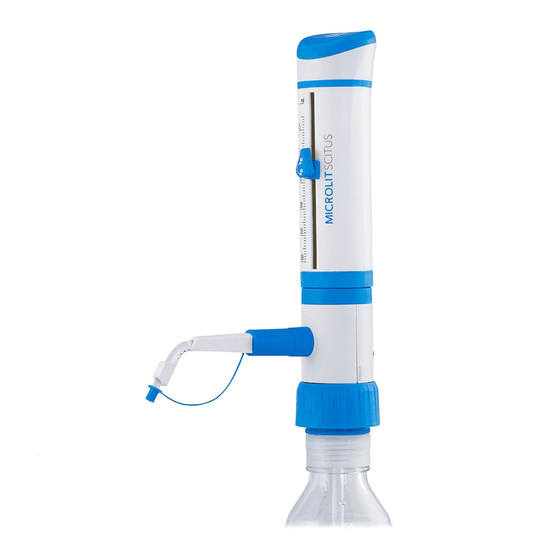
Summary of Contents for MICROLIT SCITUS
- Page 1 Designed and Manufactured by MICROLIT 629, Pakramau, Kursi Road, Lucknow – 226026, UP, India Call at: +91-8081461996, +91-9918625629 For queries: info@microlit.com For feedback: customercare@microlit.com www.microlit.com...
-
Page 2: Table Of Contents
Intended Use of the Instrument Safety Instructions Functions and Limitations of Use Operating Exclusions Storage Conditions List of Recommended Reagents First Steps Setting Up Priming Volume Setting and Dispensing Error Limits User Calibration Procedure Maintenance / Cleaning Disassembling and Assembling for Cleaning and Servicing Autoclaving Troubleshooting... -
Page 3: Intended Use Of The Instrument
Intended Use of the Instrument • Do not remove the discharge tube while the dispensing cylinder is being filled. MICROLIT SCITUS is a Bottle Top Dispenser (BTD). It is a high precision • Reagents can accumulate in the cap of the discharge tube. -
Page 4: Operating Exclusions
Code explanations: • MICROLIT SCITUS is designed for general laboratory applications and A = Good resistance complies with relevant standards, like DIN EN ISO 8655. Please check the compatibility of the instrument for a specific application (e.g. trace material B = Acceptable with limitations analysis, food sector etc.). - Page 5 List of Reagents List of Reagents (Trichloromethane) B/1/2 B/1/2 C/1/2 Covi-Ox-T70/ Mixed Tocopherol Dimethylacetamide Butyric acid...
- Page 6 List of Reagents List of Reagents Oleum (Fuming Sulfuric acid) Potassium dihydrogen phosphate Methyl ethyl ketone (MEK/Butanone) Picric acid...
- Page 7 List of Reagents Volume Adjustment Knob Main Housing Middle Housing Retainer Chuck Nut Sulfuric acid <10% Sulfuric acid (10-75%) Sulfuric acid (Cold conc.) Barrel Sulfuric acid (Hot conc.) Delivery Pipe Cover Middle Body Adapter Triethylamine Delivery Nozzle Bottle Adapter Nozzle Cap Telescopic Tube...
-
Page 8: First Steps
First Steps First and foremost – check whether everything is there in the package. 5 Bottle Adapters (28 mm, 32 mm, 38 mm, 40 mm, 45 mm) Verify that the package includes: (Fig. 7.4) 1 Bottle Top Dispenser (Fig. 7.1) 1 Calibration Certificate (Fig. -
Page 9: Setting Up
Setting Up Wear protective clothing, protective gear for the eyes and hands. Follow all safety instructions and observe limitations of use and operating constraints. (Refer to sections - 2,3,4) Fix the adapter. (Fig. 8.4) Adjust the length of the telescopic tube to fit your particular reservoir. -
Page 10: Priming
Priming Volume Setting and Dispensing Place a receiving vessel under the Dispenser's delivery nozzle. Volume setting Volume Adjustment Knob is simple and easy to operate. There are two positions of the knob as shown: Remove the Nozzle Cap. Position 1 Locked (Fig. -
Page 11: Error Limits
Dispensing Wipe off the discharge tube against the inner wall of the receiving vessel. Wear protective clothing, protective gear for the eyes and hands. Liquid may accumulate in the cap. To avoid splashes, dispense slowly. Follow all safety instructions and observe limitations of use and operating constraints. -
Page 12: User Calibration Procedure
User Calibration Procedure Maintenance / Cleaning MICROLIT SCITUS is laboratory calibrated at its nominal volume. MICROLIT SCITUS should be cleaned in the following situations: However, due to changes in environmental conditions and the viscosity of the media / fluids which are dispensed, we recommend gravimetric •... -
Page 13: Disassembling And Assembling For Cleaning And Servicing
Disassembling and Assembling for Cleaning and Servicing Procedure to disassemble the piston: Clean the cylinder with a bottle-brush. If necessary, carefully remove deposits at the edge of the glass cylinder. (Fig. 14.5) Pull the cap outwards to expose the calibration nut. (Fig. - Page 14 Procedure to disassemble the Delivery Pipe Procedure to reassemble the Delivery Pipe First push the delivery pipe into the housing so that Straighten the delivery nozzle. it is completely and securely fitted. (Fig. 14.8) (Fig. 14.11) Unscrew the chuck nut. Screw the chuck nut to complete the assembly (Fig.
-
Page 15: Autoclaving
Autoclaving MICROLIT SCITUS is fully autoclavable at 121°C (or 250°F) and 1 bar absolute (15 psi) with a holding time of at least 15 minutes. This is the piston-shaft sub-assembly. (Fig. 15.4) NOTE – Only the piston needs to be removed for autoclaving the instrument. -
Page 16: Troubleshooting
Troubleshooting Guidelines for Return Follow these guidelines, before sending the instrument for repair: Problem Possible cause Solution • Please clean the instrument carefully. Piston difficult to move Formation of crystals or Stop dispensing immediately. deposition of dirt Loosen piston in circular motion, •...

Need help?
Do you have a question about the SCITUS and is the answer not in the manual?
Questions and answers